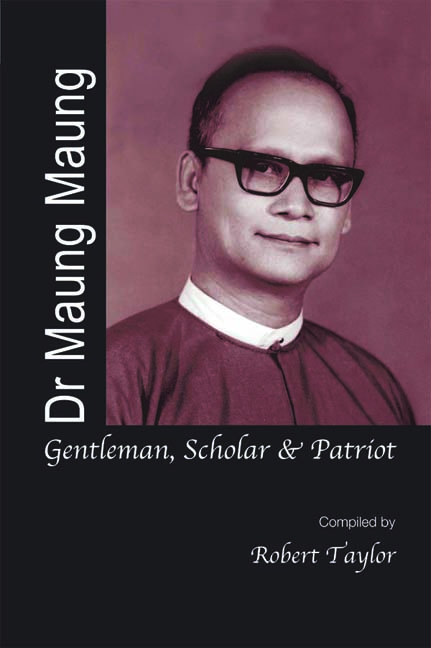Book contents
- Frontmatter
- Epigraph
- Contents
- Preface
- Acknowledgements
- Section I Dr Maung Maung: The Life of a Patriot
- Section II Dr Maung Maung's Approach to Life
- Section III Dr Maung Maung and Biography
- Section IV Dr Maung Maung and Travel
- Section V Dr Maung Maung and the Tatmadaw
- Section VI Dr Maung Maung and the Constitutions of Myanmar
- Section VII Dr Maung Maung and the Presidency
- Bibliography of Dr Maung Maung's Writings
- Index
- The Editor
Section V - Dr Maung Maung and the Tatmadaw
Published online by Cambridge University Press: 21 October 2015
- Frontmatter
- Epigraph
- Contents
- Preface
- Acknowledgements
- Section I Dr Maung Maung: The Life of a Patriot
- Section II Dr Maung Maung's Approach to Life
- Section III Dr Maung Maung and Biography
- Section IV Dr Maung Maung and Travel
- Section V Dr Maung Maung and the Tatmadaw
- Section VI Dr Maung Maung and the Constitutions of Myanmar
- Section VII Dr Maung Maung and the Presidency
- Bibliography of Dr Maung Maung's Writings
- Index
- The Editor
Summary
Despite Dr Maung Maung normally being identified in his later life as the pre-eminent civilian in the post-1962 governments of Myanmar, his four-year career in Myanmar's armed forces, the tatmadaw, was a formative period in his life and one that he often recalled. He is not unusual in that, as many men look back on their military experiences as very significant in shaping their subsequent careers. But in the case of men who served in the Burma National Army, later renamed the Patriotic Burmese Forces (PBF), before becoming the eventual nucleus of the Myanmar national army, given their crucial roles in the achievement of the country's rapid post-war independence as a consequence of their fighting first the British, and then the Japan, they have claimed to have assisted in the creation of the new independent Myanmar. In later years, indeed, the story of the army at independence became glossed with the founding of independence itself.
The first of Dr Maung Maung's publications in English is reprinted below. The Forgotten Army was published originally with a foreword by Dedok U Ba Cho, a famous Myanmar writer and the editor of The Dedok Weekly, dated 21 March 1946. It described the book “as a narrative told in an abrupt way as becomes a solider, by 2nd Lieutenant Maung Maung, a member of the P.B.F. in the recent resistance against the Japs.” It concluded with a short note written on 7 August 1945 by an anonymous British officer of the Indian Army's Observer Corps who served in Myanmar. He wrote:
On March of this year, 1945, the Burma Army, with the consent of the Nippon authorities who thought that they were going to fight against the Indian and British forces, deployed themselves in various areas across the country. The stage was set, and the curtain lost no time in going up on one of the most thrilling adventures of this war. The people's League declared war on the Japs. Things began to happen so fast that it is difficult to place them in their correct chronological order. Jap lines of communications were constantly harassed. Villagers downed their tools and refused to do any more work for the Japs. Guards had to accompany all parties of troops who were on the move. Not a night passed but there was the crack of rifle shots and the chatter of hidden machine-guns.
- Type
- Chapter
- Information
- Dr Maung MaungGentleman, Scholar, Patriot, pp. 353 - 438Publisher: ISEAS–Yusof Ishak InstitutePrint publication year: 2008

